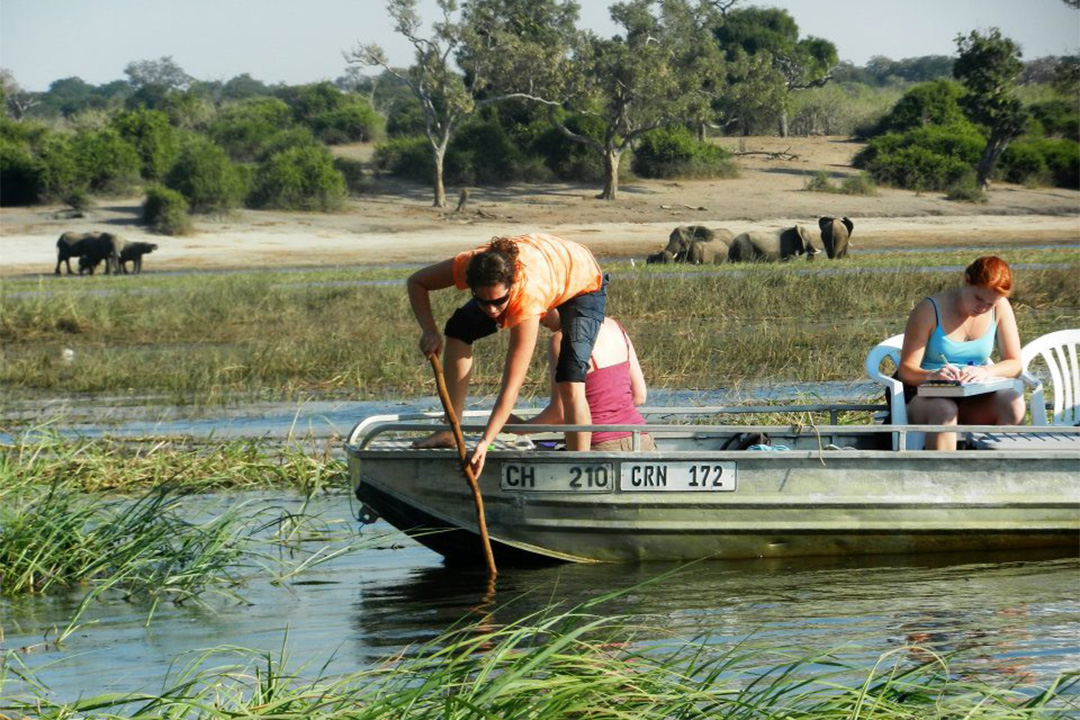
One Health student advocate to visit U of S
How can One Health be part of a student's life?
By Jeanette NeufeldThat's one of the questions that One Health student advocate Risa Pesapane will explore during her visit to the University of Saskatchewan (U of S) in mid-March.
Pesapane, who is a PhD student at the University of California (Davis) and a member of the One Health Commission Board of Directors, will give a presentation on student participation in One Health on Thursday, March 16. Her talk is part of the university's "Bringing One Health to Life" discussion series that has helped the U of S community connect with One Health experts in Saskatchewan and around the world.
WCVM Today asked Pesapane about her own experiences with One Health and why she is so passionate about the global concept.
Q: What do you study and where?
I study ecological aspects of disease transmission dynamics primarily in California but also internationally.
Q: How does your work fit into the concept of One Health?
One Health is about thinking of the world around you as an interconnected system, and disease ecology fits very nicely into that framework. I'm particularly interested in how connectivity and community composition influence the exchange of ectoparasites and microorganisms among species. Understanding the mechanisms that underlie spillover enhances our ability to maintain healthy ecosystems and limit zoonotic disease risk.
Q: How were you introduced to the idea of One Health?
I first heard the term "One Health" from my adviser in 2009 during my master's research. However I had been exposed to the idea of interdependent human and animal health a couple of years earlier.
Q: How has embracing this concept changed or shaped your career path as a student?
My passion for One Health has led me to become more deeply involved in my academic and professional communities. I have a large network of colleagues in diverse disciplines and that has translated into tremendous personal and professional growth for me. These friends and collaborators challenge me to reach outside of my disciplinary comfort zone. In fact, I've recently begun a project on One Health policy which reflects my interest in giving back to the field of One Health and in helping shape its future.
Q: How do you fit One Health into your research?
As a concept One Health is a way of thinking about a problem, so I strive to see where connections might exist between my work and the work of others. As an approach, One Health means being transparent about these potential connections and forging relationships with collaborators to address them. My current research projects involve numerous governmental and non-governmental stakeholders so I'm always working on my skills as a successful and respectful team player.
Q: How can a student engage with One Health?
I think an easy way for students to get started in One Health is to hone their skills in systems thinking and creating relationships with professionals in other disciplines. These skills are the bedrock of practising One Health, and once you have them, I think research and other opportunities start popping up naturally. It's also very valuable for students to be aware of what's happening in the larger One Health community by signing up for listservs like the One Health Commission student listserv, social media groups like the Students for One Health Facebook page, and student and professional organizations like the Next Generation group of the Global Health Security Agenda or the International Veterinary Student's Association.
Q: What's one piece of career advice you received that has helped you pursue your goals?
"Be persistent, but also patient." Interdisciplinary work of any kind is challenging, but it's also very rewarding. Most often we don't find a project that includes everything we want as students so we have to patiently cultivate these skills or experiences from different projects over time without losing faith or motivation in our original ideas.
Q: Why should someone attend your talk at the U of S?
Since I'm just a little farther along in my studies than most students who would likely attend, I can share some timely advice on the challenges and opportunities they'll face in One Health. I also think I provide a broad, fresh perspective on One Health that is somewhat unique since I'm simultaneously a student and a leader in this field. I not only understand where this concept and community have been, but I'm actively shaping where they are going. Students who attend my talk will at least gain a well-connected and compassionate colleague, but [they] may also leave with insights about their own path in One Health.
Q: What do you hope to gain from your visit to Saskatoon and to Saskatchewan?
To me every professional interaction or international trip is an opportunity to learn something new and this trip to Saskatoon offers both for me. I'm really looking forward to learning about the interface of human-animal-environmental health in Canada and the many One Health perspectives of the students and researchers at the U of S.
For more information about the discussion series or the U of S One Health Leadership Experience, visit the OHLE website.
